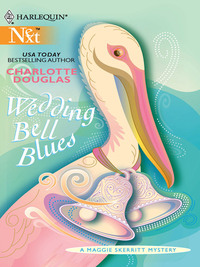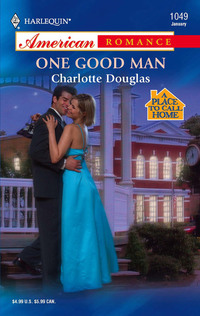
Полная версия
Holidays Are Murder

“You’re not really into this, are you?”
I sighed. Bill knew me too well. “I’ve never been a big fan of Christmas, not even as a kid.”
“That’s hard to believe. What kid doesn’t like Christmas?”
“My mother always hijacked the holiday.”
“Your family didn’t celebrate?”
“We celebrated all right, in my family’s own inimitable way.”
Bill pulled me toward him and tipped my chin with his finger until our eyes met. “You don’t have to do this—” he nodded toward the box with my Mrs. Claus costume “—if you don’t want to.”
I hesitated. Part of me wanted to take the out he’d given me and run.
“You’ve been telling me I need to lighten up and have some fun. So I’ll give it my best shot,” I said, determined to enjoy myself.
Even if it killed me.
Charlotte Douglas
USA TODAY bestselling author Charlotte Douglas, a versatile writer who has produced over twenty-five books, including romances, suspense, gothics and even a Star Trek novel, has now created a mystery series featuring Maggie Skerritt, a witty and irreverent homicide detective in a small fictional town on Florida’s central west coast.
Douglas’s life has been as varied as her writings. Born in North Carolina and raised in Florida, she earned her degree in English from the University of North Carolina at Chapel Hill and attended graduate school at the University of South Florida in Tampa. She has worked as an actor, a journalist and a church musician and taught English and speech at the secondary and college level for almost two decades. For several summers while newly married and still in college, she even manned a U.S. Forest Service lookout in northwest Montana with her husband.
Married to her high school sweetheart for over four decades, Douglas now writes full-time. With her husband and their two cairn terriers, she divides her year between their home on Florida’s central west coast—a place not unlike Pelican Bay—and their mountaintop retreat in the Great Smokies of North Carolina.
She enjoys hearing from readers, who can contact her at charlottedouglas1@juno.com.
Holidays are Murder
Charlotte Douglas

MILLS & BOON
Before you start reading, why not sign up?
Thank you for downloading this Mills & Boon book. If you want to hear about exclusive discounts, special offers and competitions, sign up to our email newsletter today!
SIGN ME UP!
Or simply visit
signup.millsandboon.co.uk
Mills & Boon emails are completely free to receive and you can unsubscribe at any time via the link in any email we send you.
Dear Reader,
Christmas in west central Florida isn’t exactly a Currier and Ives event. We still celebrate with family and friends, but we make our snow angels in white sugar sand instead of the frozen white stuff. Poinsettias grow in the landscape as well as sprouting in pots in the produce aisle and at the florist’s. And we’ve been known to crank up the air-conditioning in order to roast our chestnuts on an open fire. Floridians, as Bill Malcolm will show you, adapt creatively to Yuletide celebrations in the land of palm trees, sunshine and surf.
Like many of us, Maggie Skerritt has a lot on her plate for the holidays. I hope you’ll enjoy her at her best—and worst—in Holidays Are Murder, and that you’ll return to Pelican Bay in March 2006 for Spring Break, when Maggie matches wits with murderers again.
Happy reading, and happy holidays!
Charlotte Douglas
CONTENTS
CHAPTER 1
CHAPTER 2
CHAPTER 3
CHAPTER 4
CHAPTER 5
CHAPTER 6
CHAPTER 7
CHAPTER 8
CHAPTER 9
CHAPTER 10
CHAPTER 11
CHAPTER 12
CHAPTER 13
CHAPTER 14
CHAPTER 15
CHAPTER 16
CHAPTER 17
CHAPTER 18
CHAPTER 1
The phone rang at 12:30 a.m., awakening me from a deep sleep.
“Give me a break, Darcy,” I complained to the night dispatcher who’d called. “I’m still on vacation.”
“Sorry, Maggie. According to the chief, you’re back on the clock as of midnight.”
George Shelton, Pelican Bay’s chief of police and certifiable closet redneck, had been the bane of my existence for the past fifteen years, so his attitude didn’t surprise me. I scribbled the address Darcy gave me and hurried to dress.
Ten minutes later, with a bad case of bedhead and my body screaming for caffeine, I drove east along Main Street, deserted except for the crowded parking lot at the Blue Jay Sports Bar.
Pelican Bay, a picture-postcard retirement town and tourist mecca on Florida’s central west coast, is populated primarily by retirees and snowbirds from the northern States and Canada, and few are night owls. Once the sun sets and television enters prime time, you might as well roll up the sidewalks, because no one ventures out—aside from a few of the younger folks and the occasional criminals.
The criminals are where I come in. I’ve been a cop for over twenty-two years and a detective with the Pelican Bay Police Department for the past fifteen, and being hauled out of bed after midnight was making early retirement seem more alluring by the minute.
The address Darcy had given me turned out to be a pizza place in a strip mall a few miles west of U.S. Highway 19, the main artery that bisected the county from Tarpon Springs at the north to the Sunshine Skyway Bridge at the mouth of Tampa Bay. All of the strip stores were dark except the center one, Mama Mia’s Pizzeria. Lights blazed from the large plate-glass windows and illuminated a scattering of bistro tables and chairs in what was primarily a take-out joint.
I parked my twelve-year-old Volvo in a diagonal parking space between a Pelican Bay Police Department cruiser and the sheriff’s crime scene unit van, clipped my shield to the pocket of my blazer and climbed out.
A crescent moon hung high in the east and palm fronds rustled above the parking median’s lush floral landscaping, but a chill wind, compliments of a late November cold front, dispersed any semitropical illusions. I hurried into the pizzeria, as much to escape the cold as from any burning desire to fight crime.
Dave Adler, who’d been assigned as my partner at the beginning of the weight-loss clinic murders six weeks ago, met me at the door. Looking rested, bright-eyed and young enough to be my son, he greeted me with a grin. “How was your vacation, Detective Skerritt?”
At least I’d finally broken him of the habit of calling me “ma’am.”
“Terrific,” I lied.
During the past two weeks I’d spent several pleasant hours on the beaches of Caladesi Island and the deck of a cabin cruiser owned by Bill Malcolm, my former partner when I first became a cop with the Tampa P.D. twenty-two years ago. But for the remainder of my vacation, I’d been bored out of my gourd. Accustomed to working 24/7 in our understaffed CID—Criminal Investigation Department—for a decade and a half, I’d forgotten how to relax and enjoy myself. Without new or cold cases to occupy my mind, I had wandered my waterfront condo, restless and unable to concentrate, even on the popular novels I was so fond of.
“New hairdo?” Adler asked.
I resisted the urge to wipe the teasing grin off his too young, too handsome face. “What have we got?”
“Armed robbery.”
“Anyone hurt?”
Adler shook his head. “The owner’s shook up. She was the only one here.”
“Mama Mia?”
He nodded, then jerked his head toward a door behind him. “She’s back there.”
I crossed the room, heavy with the smell of onions and Italian spices, rounded the take-out counter and entered the office at the back.
Steve Johnson, the patrolman who had responded to the 911 call, stood beside a woman who huddled in a desk chair and was trying to light a cigarette with trembling fingers. Johnson, big and beefy with a paunch that didn’t need supplementing, stuffed the last of a slice of cold pizza into his mouth. “Hey, Maggie. Thith ith Maria Ridoletthi, th’owner.”
“Maria Ridoletti?” I clarified. Johnson’s full mouth had made me guess at the correct pronunciation.
Johnson swallowed hard. “Yeah. I’ll be out front if you need me.”
“Keep your hands in your pockets and your mouth closed. For all I know, you just consumed evidence.” I smiled to take the bite out of my criticism. Johnson wasn’t the brightest bulb in the chandelier, but his heart was in the right place. However, with the department under siege by a city council lobbying to shut us down and save taxpayer money by contracting with the county sheriff to take over policing Pelican Bay, we couldn’t afford any screw-ups.
His pudgy face flushed with embarrassment, Johnson slid past me to the door and left me alone with Mama Mia.
“You want to tell me what happened?” I asked.
Maria Ridoletti was far from my image of an Italian mother. Midthirties, rake thin with stringy dark hair, narrow face and a body that looked as if she’d never eaten pizza or much of anything else, she stared up at me with dazed, black-lined eyes. “I was robbed.”
“By a customer?”
She shook her head. “I’d already closed and locked up for the night. I was just beginning to count the day’s receipts for the night deposit when I looked up and found him standing right where you are now. When he saw me, he jumped, like he hadn’t expected anyone to be here.”
“Was he someone you recognized?”
Maria nodded.
I dug deep for patience and asked, “Who was he?”
“Bill Clinton.”
“Who?” Somewhere in my sleep-deprived brain, Bill Clinton’s appearance at a pizza parlor made perfect sense. Especially since Mickey D’s had closed for the night.
“You know,” Maria said. “Bill Clinton, the former president.”
I was about to call the CSU tech to bag what she was smoking when she explained.
“It was a mask, like on Halloween.”
“A big man?”
She shook her head. “A runt, no bigger than me. But he kept one hand in his pocket and acted like he had a gun. So I didn’t argue when he ordered me to hand over the cash.”
“You’re sure it was a man?”
She closed her eyes a moment, as if trying to remember, then nodded. “Yeah. No boobs, no butt. Scrawny neck with a big Adam’s apple.”
“Deep voice?”
“No, sort of squeaky.”
“As if he was trying to disguise it?”
Maria shrugged. “Maybe.”
“Did you see any identifying marks? Scars? Tattoos?”
“Except for his neck, he was pretty much covered up. Even wore gloves.”
“What else was he wearing?”
“Jeans. A Buccaneer ball cap and sweatshirt. Black Nikes.”
I couldn’t help sighing. She’d just described the wardrobe of choice of almost half the men in the Tampa Bay area. “You said you locked the front door. Was the back locked, too?”
She nodded. “I always double check the doors before I count the money.”
“So how did Mr. Clinton get in? You have any employees with keys?”
“No way. I can’t pay much, so the turnover here’s pretty high. Don’t have anyone I’d trust with keys.” She took a long pull on her cigarette and exhaled.
I waved away the smoke. “Security system?”
She grimaced. “Never thought I needed one till now.”
“How much did Clinton steal?”
“I hadn’t finished counting. Most of our business is credit cards, but we sell a lot of pizza during Sunday football games. Had to be somewhere between six hundred and a thousand dollars.” Her black-lined eyes misted with tears. “Times are tight, Detective. Will I get it back?”
Probably not. “We’ll do our best.”
“Detective Skerritt.” Adler stood in the doorway. “Come look at this.”
“You okay?” I asked Maria.
She swiped at her eyes with the back of one hand, smearing her eyeliner, then nodded and took another drag. I didn’t have the heart to remind her about the state law that banned smoking in restaurants.
“Sit tight. I’ll be right back.” I left the room and followed Adler down a hallway that branched to the kitchen on the right, restrooms on the left. He shone his Maglite at the ceiling. Where the grate for the air-conditioning duct should have been was a gaping hole.
I groaned. “We’ve got ourselves a rooftop burglar.”
I continued down the hall, pushed the panic bar on the rear exit and stepped outside. A gust of wind blew a tattered newspaper across the rear parking lot, empty except for a car I later learned was Ridoletti’s. A dog barked in the distance. In the harsh glow of security lights, I scanned the back of the building. A Dumpster stood along the rear wall with a wooden pallet leaning against it. Another pallet atop the Dumpster rested against the wall like a ladder.
“There’s your access,” I said. “Make sure the techs process this area.”
Fresh skid marks from a single narrow tire indicated the perp might have made his getaway by bike. Or it could have been a track left earlier in the day by a kid just passing through.
I nodded to the row of mobile homes in the trailer park that backed up to the strip mall. “We’ll start a canvass. Maybe the neighbors saw something.”
“Now?” Adler lifted his eyebrows in surprise. “It’s almost 2:00 a.m.”
“Most of those folks are in their late seventies and eighties,” I reminded him. “They won’t remember squat by daybreak.”
“That’s cold, Maggie.”
“We’re in a cold business, Adler.”
Eight hours and an equal number of cups of coffee later, I sat at my desk in CID and typed my report. None of the neighbors behind Mama Mia’s had seen or heard anything. Unlike the popular television crime dramas that have the culprit in custody within an hour—including commercial breaks—our crime lab techs had found zip, but not for lack of trying. To make matters worse, Maria Ridoletti was already proclaiming to all who would listen that if the sheriff’s department had been handling the case, she’d probably have her money back by now.
I finished the report and tried to ignore the foreboding in my gut. Examining the strip mall, I’d noted that Bloomberg’s Jewelers was next door to Mama Mia’s. Maria had stated that the robber had been startled to encounter her. Apparently not expecting to confront anyone, however, he’d worn a mask, even though business hours were long over. That fact suggested he’d prepared for surveillance cameras, which were prevalent in Bloomberg’s. My guess was that the thief had intended to hit the jewelry store but had become disoriented on the roof and picked the wrong air duct for entry.
If there was anything worse than a burglar, it was a stupid burglar. Maria Ridoletti was lucky he hadn’t panicked and shot her. I figured the only reason he hadn’t was that he hadn’t actually had a gun.
This time.
“Skerritt! Get in here!” Chief Shelton’s voice reverberated through the building from his office at the other end of the hall. Whenever his temper escalated, he abandoned the intercom for a more direct and intimidating form of communication.
Hoping to respond before his infamous temper boiled over, I hurried to his office. Kyle Dayton flashed me a sympathetic glance as I passed his post at the dispatch desk.
“Close the door,” Shelton snapped when I entered his pine-paneled inner sanctum.
I shut the door behind me and waited for the chief to speak. For several weeks after the city council had first broached disbanding the police department, Shelton had discarded his fireball personality and slunk around the P.D. like a whipped dog. But somehow he’d regained his pugnacious attitude, the fiery spirit that had seen him through the Vietnam War and his early KKK days in the Georgia foothills and had ultimately made him a contender in the political arena. Politics was the only reason he held his $180,000 a year position, because Shelton had the policing and personnel skills of a gnat.
“You got a lead on this rooftop burglar?” Midmorning sunlight glinted off his bald head and his pale blue eyes squinted in the glare from the window that overlooked the city park.
“Not yet. No physical evidence was recovered at the scene, and the perp was masked.”
“Dammit, Skerritt, first a serial murderer and now this. How the hell do you expect us to keep our department—”
“Crime happens, Chief. That’s why we’re here.”
Shelton’s face reddened and a vein bulged at his temple. “We’re here to keep crime from happening, and if we don’t, we sure as hell won’t be here much longer. There’ll be sheriff’s cruisers patrolling these streets instead of our green-and-whites!”
“You want me to consult a psychic?” I already knew the answer, but Shelton’s dumbfounded expression was worth asking the question.
“Hell, no. Just solve the damn case.”
“With no suspects, no leads, no hard evidence, that’s a problem. I could put the word out to our usual informants, offer to pay for info in case the perp blabs to his cronies or flashes his take around town.”
Shelton shook his head with a guttural growl. “Whatever you do, keep expenses down. Money’s the whole issue behind the council’s push to can us.”
“I’ll do my best.”
I turned to leave.
“And, Skerritt,” he added.
“Yes?”
“Good luck.”
“Thanks, Chief.”
I knew he’d say that. Luck, after all, was free.
After fruitless hours of scanning mug shots and vital statistics in search of a runt who could fit through air ducts, I shut down my ancient computer and called it a day at 7:00 p.m.
Bill Malcolm met me at the Dock of the Bay, a restaurant and bar that overlooked the marina where Bill’s thirty-eight-foot cabin cruiser, the Ten-Ninety-Eight was moored. Bill, who had lived on board since his retirement from the Tampa P.D. two years ago, had offered to cook supper for me in his galley kitchen, but I’d turned him down. Our relationship had taken an unexpected turn during my vacation. For years he had been joking about my marrying him, but now I wasn’t so sure he was joking any longer, and I was uncertain how I felt about that change. I loved him, without question. One other fact of which I was completely certain, however, was that I wasn’t a good candidate for marriage. In reality, no cop was, hence the skyrocketing divorce rate for police officers.
Years ago Bill’s wife, spooked by fear of his dying in the line of duty, had divorced him and moved to Seattle with their only daughter, Melanie. Bill had been heartbroken. I’d stepped in to help with his daughter on her infrequent visits, and my relationship with Bill had deepened, then stalled in limbo when I’d put on the brakes. I still wasn’t sure what had stopped me, fear of commitment or an equal anxiety over the true depth of Bill’s feelings for me.
One thing was undeniable. Bill had been my best friend since our first days on patrol for the Tampa P.D. twenty-two years ago, and I didn’t want anything to spoil that friendship. Tonight, although he’d been retired from the job for two years, I looked forward to hearing his take on my rooftop burglar.
I slid into a booth across from Bill. Toby Keith belted out “How Do You Like Me Now?” from the ancient Wurlitzer in the corner, and locals from the marina filled the stools at the bar and watched a pregame football show on the new plasma-screen television high on the wall in the corner.
Bill greeted me with a grin. His thick hair, once brown, was now white, a handsome contrast to his deep tan, and his blue eyes retained their boyish charm. “I already ordered.”
“No problem.” I always had an old-fashioned burger all the way with fries, and Bill was well versed in my preferences.
The waitress served frosted mugs of cold beer and when she left, Bill said, “For someone who just came off vacation, you look tired.”
“I bet you say that to all the girls.”
“You also look beautiful,” he hastened to add, “but I’m worried about you. You wore yourself out on the weight-loss clinic murders. I was hoping with those solved, you might slow down a bit.”
“No rest for the weary.” I sipped my beer and hoped it wouldn’t send me into a deep coma.
While we waited for our food, I gave Bill the details on our rooftop burglar. “Looks like I’ve hit a wall,” I said when I’d finished.
“Have you tried tracking the Clinton mask?”
“Adler worked on it all day. But the masks were produced over a decade ago and carried by the thousands by Wal-Mart and K-Mart, as well as other specialty stores. Nobody kept records on individual purchases of the masks. Besides, you know how many transients and new residents we have in this county. That mask could have been brought in from anywhere in the country.”
“What about online?”
“I’ll make sure Adler checked that, too.” I hated computers, didn’t own one and barely tolerated using the one at work. In a profession becoming increasingly high tech, my technophobia was another compelling reason to toss in the towel. I refused to own a cell phone and only reluctantly carried a beeper.
Our meals arrived and as I bit into my burger with gusto, I realized I’d forgotten to eat lunch. Good thing, since the food in front of me represented an entire day’s ration. Fresh memories of three overweight murder victims had me counting calories.
Bill put down his burger and wiped his lips with his napkin. “Margaret—”
Besides Bill, only members of my immediate family called me Margaret. When I’d first partnered with him, he’d called me Princess Margaret, a derogatory reference to my debutante days, but after I saved his life during a domestic dispute call, I’d won his respect and he’d referred to me as Skerritt on the job. Later, after his divorce, when our relationship developed outside of work, he’d begun calling me Margaret, often with a tenderness I found hard to resist.
“Margaret, I’ve given this a lot of thought.” His blue eyes locked gazes with mine and his expression was deadly serious.
My heartbeat stuttered. Had my unwavering rejections of his marriage proposals convinced him to move on?
“I’ve decided,” he continued, “to accept your invitation to have Thanksgiving at your mother’s.”
“That wasn’t an invitation,” I said, relieved only until the prospect of Bill and my mother in the same room hit me. “That was a threat.”
“She can’t be that bad.”
“She doesn’t approve of anything about me,” I countered. “And she lets me know it every time our paths cross.”
My mother was a social scion of Pelican Bay. Her father had been a prominent physician, my late father a distinguished cardiologist, and she enjoyed her position of wealth and influence. When I had graduated from college with a degree in library science and announced my engagement to Greg Singleford, who was completing his internship in the ER, Mother had been over the moon. But Greg’s brutal murder by a crack addict in an ER treatment room had changed everything.
I’d loved Greg with all the passion and innocence of youth, and his death had shaken my core values. As a result, I couldn’t see spending my life with books, or, as my mother had intended, at meetings of the Junior League and Art Guild, once I’d realized that the world was such a dangerous place. Daddy had supported my decision to enter the police academy and had openly expressed his pride in my accomplishments. He’d served as a buffer between Mother and me until his death twelve years ago. But Mother had been horrified from the beginning that her younger daughter had chosen a down-and-dirty career in law enforcement over social prestige. And she never let me forget it. During the recent publicity over my arrest of Lester Morelli for the clinic murders, she’d taken to her bed with a sick headache and had remained there until after Morelli had been indicted and the news coverage had ceased.












